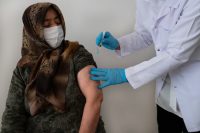Immunizations (also called vaccinations) can help keep communities safe and healthy, especially with the changing of seasons. As we move into the winter months, respiratory illnesses like flu, COVID-19, RSV, and pneumonia become more common. The following blog post contains answers to six questions on common illnesses and vaccines for this time of year. As…











